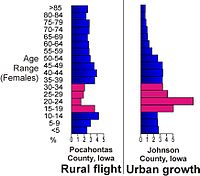
Real‐time use of audio‐biofeedback can improve postural sway in patients with degenerative ataxia
Sign Up to like & getrecommendations! Published in 2019 at "Annals of Clinical and Translational Neurology"
DOI: 10.1002/acn3.699
Abstract: Cerebellar ataxia essentially includes deficient postural control. It remains unclear whether augmented sensory information might help cerebellar patients, as the cerebellum underlies processing of various sensory modalities for postural control. Here, we hypothesized that patients… read more here.
Keywords: postural control; audio biofeedback; time use; real time ... See more keywords

Temporal refuges of a subordinate carnivore vary across rural–urban gradient
Sign Up to like & getrecommendations! Published in 2022 at "Ecology and Evolution"
DOI: 10.1002/ece3.9310
Abstract: Abstract Animals exhibit variation in their space and time use across an urban–rural gradient. As the top‐down influences of apex predators wane due to human‐driven declines, landscape‐level anthropogenic pressures are rising. Human impacts can be… read more here.
Keywords: time use; time; urban rural; carnivore ... See more keywords

Unitary or collective households? A nonparametric rationality and separability test using detailed data on consumption expenditures and time use
Sign Up to like & getrecommendations! Published in 2021 at "Empirical Economics"
DOI: 10.1007/s00181-021-02033-3
Abstract: We document a nonparametric test for weak separability between time use and consumption goods applied to unique time-use data on Belgian singles and households. The test outcomes reject the hypothesis of weak separability, indicating that… read more here.
Keywords: time; unitary collective; consumption; separability ... See more keywords

Quality of Life, Coping Styles, Stress Levels, and Time Use in Mothers of Children with Autism Spectrum Disorders: Comparing Single Versus Coupled Households
Sign Up to like & getrecommendations! Published in 2017 at "Journal of Autism and Developmental Disorders"
DOI: 10.1007/s10803-017-3240-z
Abstract: This study aimed to examine the influence of differences in household status on the parental stress, coping, time use and quality of life (QoL) among mothers of children with autism spectrum disorders. Forty-three single and… read more here.
Keywords: mothers children; use; time use; stress ... See more keywords

A Time-use Study of Immigrant Mothers’ Positive Emotions Raising a Child with ASD
Sign Up to like & getrecommendations! Published in 2020 at "Journal of Child and Family Studies"
DOI: 10.1007/s10826-020-01732-2
Abstract: To understand Mexican heritage mothers’ positive emotional experiences raising their children with autism spectrum disorder (ASD), we examined whether mothers’ positive emotions varied by their household income, educational attainment, and their occupational and marital status.… read more here.
Keywords: use study; mothers positive; time use; positive emotional ... See more keywords

How does paid work affect who does the childcare? An analysis of the time use of Australian couples
Sign Up to like & getrecommendations! Published in 2017 at "Review of Economics of the Household"
DOI: 10.1007/s11150-014-9274-5
Abstract: This paper analyzes the effect of paid work by coupled parents of young children on the joint decisions to spend time engaged in childcare. We explore this using Australian Time-Use Survey data from 2006. We… read more here.
Keywords: work; paid work; time use; effect ... See more keywords

The effect of macroeconomic conditions on parental time with children: evidence from the American time use survey
Sign Up to like & getrecommendations! Published in 2017 at "Review of Economics of the Household"
DOI: 10.1007/s11150-017-9368-y
Abstract: This paper investigates the effect of changes in macroeconomic conditions on time allocation to children among mothers and fathers in the US. The study relies on 2003–2013 American Time Use Survey (ATUS) data. Accounting for… read more here.
Keywords: time children; use survey; time; time use ... See more keywords

Patterns of Time Use Across the Life Span in Korea: A Latent Class Analysis and Age and Gender Differences
Sign Up to like & getrecommendations! Published in 2017 at "Social Indicators Research"
DOI: 10.1007/s11205-016-1463-6
Abstract: The purpose of this study was to gain an understanding of time use and the patterns of time use across the life span using a socioemotional selectivity theory. The data used for this study were… read more here.
Keywords: age; gender; time; time use ... See more keywords

Distributed-elite local search based on a genetic algorithm for bi-objective job-shop scheduling under time-of-use tariffs
Sign Up to like & getrecommendations! Published in 2020 at "Evolutionary Intelligence"
DOI: 10.1007/s12065-020-00426-4
Abstract: The rapid growth of electricity demand has led governments around the world to implement energy-conscious policies, such as time-of-use tariffs. The manufacturing sector can embrace these policies by implementing an innovative scheduling system to reduce… read more here.
Keywords: local search; time; time use; use tariffs ... See more keywords

Trends in Children’s Gendered Housework Performance. Time Use Evidence from Germany, 1991–2013
Sign Up to like & getrecommendations! Published in 2019 at "Child Indicators Research"
DOI: 10.1007/s12187-019-09702-x
Abstract: Like their parents, children are productive members of their households and may contribute to housework. This study is the first to examine trends in children’s housework behavior in Germany. Using data from the German Time… read more here.
Keywords: time; time use; trends children; 1991 2013 ... See more keywords

Inducing flexibility of household electricity demand: The overlooked costs of reacting to dynamic incentives
Sign Up to like & getrecommendations! Published in 2021 at "Applied Energy"
DOI: 10.1016/j.apenergy.2020.116283
Abstract: Abstract Flexible electricity demand through dynamic pricing 1 is becoming more critical for net-balancing as the share of intermittent wind and solar electricity production increases. However, people are prone to habits and regularity, so this… read more here.
Keywords: electricity demand; reacting dynamic; time use; household ... See more keywords